笨狼发牢骚
发发牢骚,解解闷,消消愁英国人,不会张口说瞎话,不过挑拨一下,绕着说,酸溜溜的,不可避免的了。说中俄历史关系复杂,曾经是世仇【1】,目前关系属于权宜之计,说的也是,但也属挑拨,举个例子,美日关系怎么讲?
亚投行图:

无疑目前中国站上风,占主导地位,合理的,尽管俄国是军事大国(真正打起来,实力未必撑得住),但经济跟中国一比,差远了。俄国能靠中国一把,在其当今恶略的国际环境下,实属幸运。
普京别三心二意了。
【1】
历史上俄罗斯侵占中国领土,确实难以忘却。从长计议。
Brothers again? How deep is the Xi-Putin bromance?
Carrie Gracie, 24 April 2015
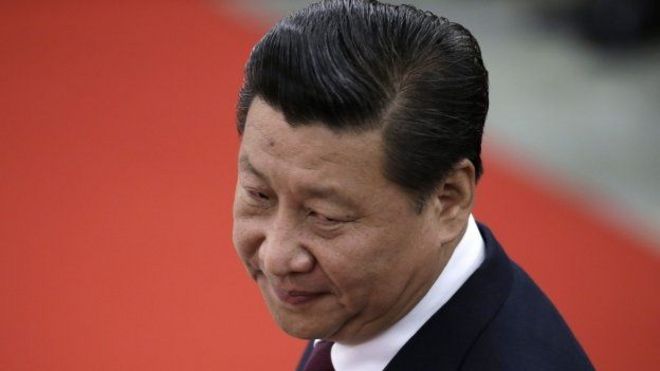
Xi Jinping wants to work with Russia
Next month, Western leaders will be conspicuously absent from President Vladimir Putin's military parade to mark the 70th anniversary of the Allied victory in the Second World War.
【下月在莫斯科举行的二战纪念仪式上,中国将是参加纪念的世界上唯一经济大国】
President Barack Obama and EU leaders are staying away from the Red Square commemoration to express their outrage at Russia's role in Ukraine.
Alongside a selection of autocrats including Kim Jong-un of North Korea and Islam Karimov of Uzbekistan, President Xi Jinping of China will be the guest of honour.
Until recently, President Putin was promoting a Eurasian vision, a union which would run "from Dublin to Vladivostok".
But as the Ukraine crisis has deepened and the year-old US-led sanctions against Russia bite, China is now the only major economy outside the sanctions regime and Russia and China are closer than at any time in half a century.
Russia's ambassador to China, Andrey Denisov, said: "President Putin and President Xi met five times last year. They will meet at least as many times this year. This shows the importance of the political dialogue."
President Xi and President Putin describe themselves as "good friends".
Both like to present themselves as strong national leaders who will rebuild past glory.
Long-standing enemies
But the ambassador and I were talking in the same embassy greeting room where Chairman Mao met the leader of the Soviet Union Nikita Khruschev in 1959, and the ambassador acknowledged that despite the smiles and warm language on that occasion, a precipitous decline in relations was just round the corner, one which left Moscow and Beijing mortal enemies for the best part of two decades.
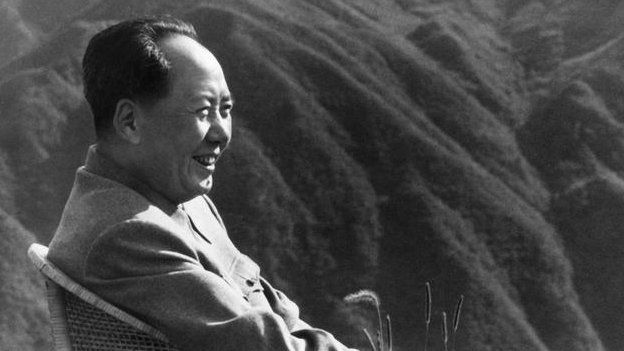
Chairman Mao oversaw a decline in relations with the Soviet Union
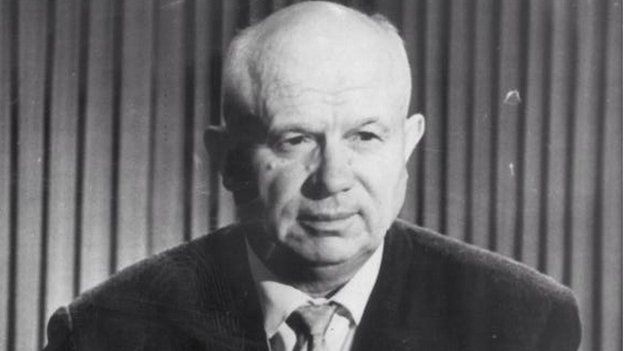
Nikita Khruschev viewed China as an enemy
Chairman Mao even ordered the residents of the Chinese capital to dig air raid shelters and an underground city in preparation for attack.
But nowadays Beijing's foreign policy puts pragmatism above ideology.
Its diplomats are well practised at exploiting differences between Moscow and Washington to China's advantage, and the Ukraine crisis has offered a valuable opportunity.
This is not to say that Ukraine hasn't presented Beijing with challenges.
China claims its central foreign policy principles are sovereignty, territorial integrity and non-interference.
If these principles were driving Chinese policy, it might have been expected to condemn Russian actions in Ukraine.
Chinese-Russian relations【中俄大事表】But a more important tenet still is an unspoken one, not to criticise friends in public.
1961: China formally denounces the Soviet version of communism
1969: Border war between the two nations
1976: Tensions begin to ease following the death of Mao Zedong
1992: Russian President Boris Yeltsin visits China
1998: Joint communique pledging to build an "equal and reliable partnership"
2001: Treaty signed setting out a 20-year strategy for working together
2009: Over 40 contracts worth roughly $3bn agreed between the two countries
2010: Completion of first pipeline built between China and Russia
Between Ukraine and Russia, Beijing refused to take sides.
This month, Russian media reported the Chinese Foreign Minister Wang Yi saying sanctions make the Ukraine situation worse: "China has stuck to an objective and unbiased position on the Ukrainian crisis.
"From the beginning we have insisted that settlement should be carried out exclusively by political means."
Chinese advantages
In fact, the Ukraine crisis has substantially advanced Chinese national interest.
As it lost friends in European capitals, Moscow has urgently needed markets and friends in the East, and last May it signed a 30-year gas deal worth $400bn (£266bn) with fuel-hungry China.
The Power of Siberia project, the largest in the world, had been stuck in negotiation for 10 years due to arguments over price.
Russia's diplomatic isolation made the difference and most analysts concluded that China had got a good bargain.
China has not criticised Russia over the unrest in Ukraine
Again in November last year, the two sides signed a framework agreement on a second gas pipeline, this time from western Siberia to north-west China.
As important, the Ukraine crisis advances China's strategic agenda.
Along with the multiple unfolding emergencies in the Middle East, it helps distract the US from a coherent focus on East Asia, and by driving Moscow into a firmer Chinese embrace, it secures Beijing's back so that it can give its full attention to frustrating US leadership in the Asia Pacific.
Put simply, China needs Russia to provide natural resources and a stable strategic hinterland, and Russia is now signed up to that project.
Dimitri Trenin, of the Carnegie Moscow Centre, says this is a triangle in which Beijing rather than Washington is in the commanding position: "The US needs to realise that it's most serious competitor in the 21st century can now rely more than ever on the resources and support of its 20th century adversary.
"We're talking about a new Eurasia emerging with China very much the centre of it - and Chinese-led projects are changing the face of Eurasia more than anything since the days of Genghis Khan."
Banking initiative
One of those projects is the Chinese-led Asian Infrastructure Investment Bank (AIIB).
The AIIB is still on the drawing board and hasn't issued a single loan, but it has already delivered a sharp diplomatic blow to the United States.
The Asian Infrastructure Investment Bank agreement was signed in October by 21 countries, including China
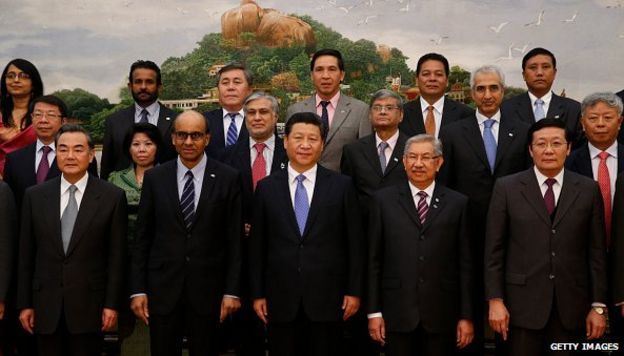
The Asian Infrastructure Investment Bank agreement was signed in October by 21 countries, including China
Ignoring Washington's opposition, many US friends applied to become founder members.
The shock was almost as great in Beijing as it was in Washington.
Chinese negotiators had never imagined old US allies like the UK and Australia falling into their arms.
As that was so easy, China's strategic planners will now be thinking of other ways to test American leadership in the region.
They don't have to look far. In January's State of the Union address, President Obama urged Congress to help him secure a trade agreement for Asia:
"China wants to write the rules for the world's fastest-growing region. That would put our workers and our businesses at a disadvantage. Why would we let that happen? We should write those rules."
Indeed President Obama is trying to write those rules as part of his strategic foreign policy initiative, the "pivot to Asia".
President Obama made closer relations with Asia a key priority of his first term
His administration is promoting the Trans-Pacific Partnership (TPP) which would cover a dozen countries.
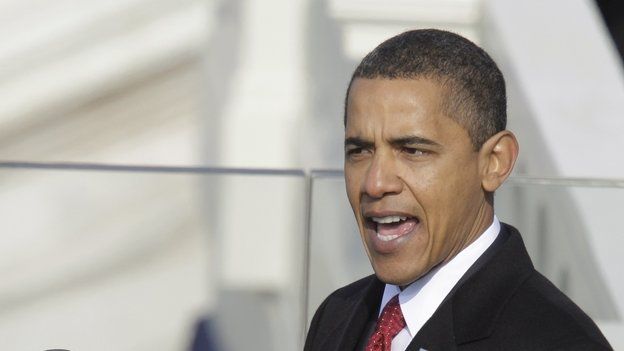
President Obama made closer relations with Asia a key priority of his first term
China is not included and Beijing sees the TPP as an attempt at economic containment.
Unsurprisingly, it is working on a rival trade deal and to prepare the ground, it has carefully toned down some of the confrontational tactics and rhetoric which alarmed neighbours around the East and South China Sea this time last year.
President Xi has moved from strategic military initiatives to strategic economic ones, rolling out a vision for a Silk Road Economic Belt which promises multi-billion dollar loans to build energy and transport infrastructure for Central Asia, and a parallel Maritime Silk Route which will do the same for South East Asia.
This week the Chinese president has been out on a charm offensive, in Pakistan promoting the first vision and in Indonesia pushing the second.
Meanwhile President Obama's TPP project is bogged down in Washington's congressional politics.
As time runs out for the Obama administration and the focus shifts towards a presidential election, regional allies worry that the US is distracted, disengaged and even dysfunctional in face of the challenge from China.
But the US seems relaxed about the evolving China-Russia relationship, viewing the marriage of Russian bear and Chinese dragon as a marriage of convenience where claws will soon be unsheathed by one side or the other.
President Obama said (to the Economist) last August: "Russia I think has always had a Janus-like quality, both looking east and west, and I think President Putin represents a deep strain in Russia that is probably harmful to Russia over the long term….But I do think it's important to keep perspective."
Dynamic ambition
The difference is dynamic Chinese ambition in the region.
Chinese leaders believe the US will never willingly surrender its status as the pre-eminent power in Asia.
Their own long-term policy is to squeeze the US out.
Regional initiatives on development and trade are as much a part of that game plan as military modernisation.
A "strategic partnership" with Russia is a big piece of this puzzle, securing more than 4,300 kilometres of shared border, delivering Central Asia to the Sino-centric economic blueprint and stalling Japanese attempts to find partners to counteract Chinese territorial claims.
When President Obama came to office in 2009, his stated foreign policy objectives were to reset the relationship with Russia and to "pivot to Asia".
But as he nears the end of his second term, it is China which has reset the relationship with Russia, and Russia which has pivoted to Asia.




